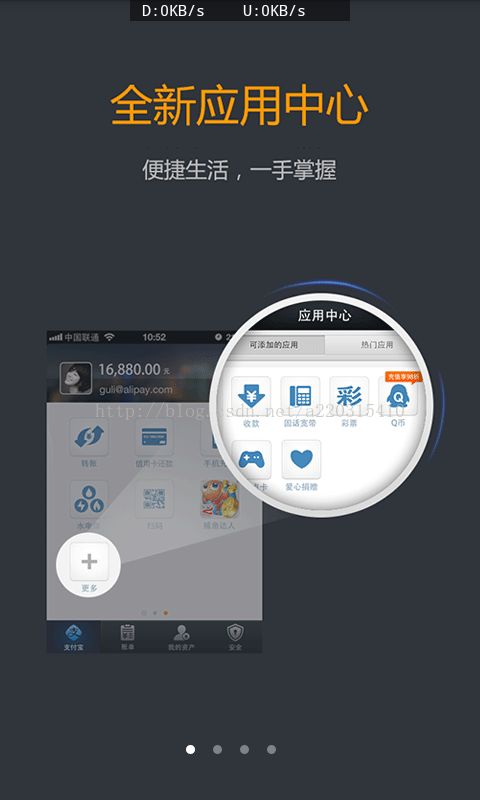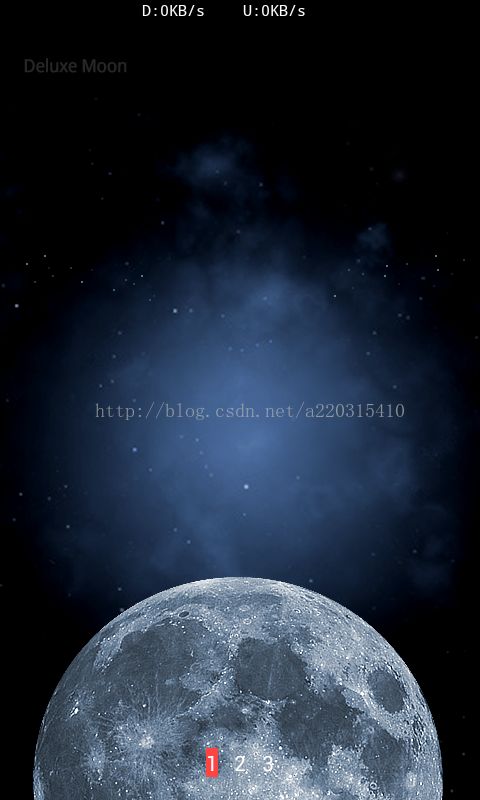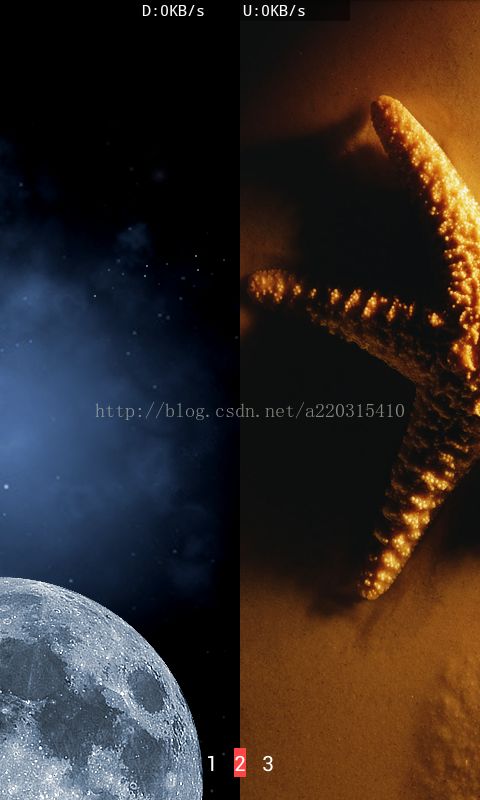基于ViewFlipper实现图片切换
在很多App上我们经常看到这些效果:
 淘宝首页自动滚动的图片展示效果
淘宝首页自动滚动的图片展示效果 支付宝应用第一次启动启动的用户引导画面
支付宝应用第一次启动启动的用户引导画面
要实现这些效果,有些控件可以帮助我们:
1. ViewPager
2. ViewFlipper
3. Fragment
好吧,我最终选择了ViewFlipper,因为它的使用最干劲清爽(往里面放几个View就行了),而且还支持自动播放。
不过,为了实现上面两个效果,还得解决来年两个问题:
1. 如何在ViewFlipper滚动的时候,获得当前展示的child id?
2. 和ViewPager原生支持触摸滑动翻页不同,ViewFlipper需要自己监听手势来解决。
问题1:其实,我挺奇怪的,Google既然为ViewAnimation做了个ViewFlipper的子类来支持自动翻滚,怎么不给它添加一个listener以监听翻滚事件呢?
好吧,既然google不给,那就自己加。首先看ViewFlipper的源码(
/*
* Copyright (C) 2006 The Android Open Source Project
*
* Licensed under the Apache License, Version 2.0 (the "License");
* you may not use this file except in compliance with the License.
* You may obtain a copy of the License at
*
* http://www.apache.org/licenses/LICENSE-2.0
*
* Unless required by applicable law or agreed to in writing, software
* distributed under the License is distributed on an "AS IS" BASIS,
* WITHOUT WARRANTIES OR CONDITIONS OF ANY KIND, either express or implied.
* See the License for the specific language governing permissions and
* limitations under the License.
*/
package android.widget;
import android.content.BroadcastReceiver;
import android.content.Context;
import android.content.Intent;
import android.content.IntentFilter;
import android.content.res.TypedArray;
import android.os.Handler;
import android.os.Message;
import android.util.AttributeSet;
import android.util.Log;
import android.view.accessibility.AccessibilityEvent;
import android.view.accessibility.AccessibilityNodeInfo;
import android.widget.RemoteViews.RemoteView;
/**
* Simple {@link ViewAnimator} that will animate between two or more views
* that have been added to it. Only one child is shown at a time. If
* requested, can automatically flip between each child at a regular interval.
*
* @attr ref android.R.styleable#ViewFlipper_flipInterval
* @attr ref android.R.styleable#ViewFlipper_autoStart
*/
@RemoteView
public class ViewFlipper extends ViewAnimator {
private static final String TAG = "ViewFlipper";
private static final boolean LOGD = false;
private static final int DEFAULT_INTERVAL = 3000;
private int mFlipInterval = DEFAULT_INTERVAL;
private boolean mAutoStart = false;
private boolean mRunning = false;
private boolean mStarted = false;
private boolean mVisible = false;
private boolean mUserPresent = true;
public ViewFlipper(Context context) {
super(context);
}
public ViewFlipper(Context context, AttributeSet attrs) {
super(context, attrs);
TypedArray a = context.obtainStyledAttributes(attrs,
com.android.internal.R.styleable.ViewFlipper);
mFlipInterval = a.getInt(
com.android.internal.R.styleable.ViewFlipper_flipInterval, DEFAULT_INTERVAL);
mAutoStart = a.getBoolean(
com.android.internal.R.styleable.ViewFlipper_autoStart, false);
a.recycle();
}
private final BroadcastReceiver mReceiver = new BroadcastReceiver() {
@Override
public void onReceive(Context context, Intent intent) {
final String action = intent.getAction();
if (Intent.ACTION_SCREEN_OFF.equals(action)) {
mUserPresent = false;
updateRunning();
} else if (Intent.ACTION_USER_PRESENT.equals(action)) {
mUserPresent = true;
updateRunning(false);
}
}
};
@Override
protected void onAttachedToWindow() {
super.onAttachedToWindow();
// Listen for broadcasts related to user-presence
final IntentFilter filter = new IntentFilter();
filter.addAction(Intent.ACTION_SCREEN_OFF);
filter.addAction(Intent.ACTION_USER_PRESENT);
getContext().registerReceiver(mReceiver, filter);
if (mAutoStart) {
// Automatically start when requested
startFlipping();
}
}
@Override
protected void onDetachedFromWindow() {
super.onDetachedFromWindow();
mVisible = false;
getContext().unregisterReceiver(mReceiver);
updateRunning();
}
@Override
protected void onWindowVisibilityChanged(int visibility) {
super.onWindowVisibilityChanged(visibility);
mVisible = visibility == VISIBLE;
updateRunning(false);
}
/**
* How long to wait before flipping to the next view
*
* @param milliseconds
* time in milliseconds
*/
@android.view.RemotableViewMethod
public void setFlipInterval(int milliseconds) {
mFlipInterval = milliseconds;
}
/**
* Start a timer to cycle through child views
*/
public void startFlipping() {
mStarted = true;
updateRunning();
}
/**
* No more flips
*/
public void stopFlipping() {
mStarted = false;
updateRunning();
}
@Override
public void onInitializeAccessibilityEvent(AccessibilityEvent event) {
super.onInitializeAccessibilityEvent(event);
event.setClassName(ViewFlipper.class.getName());
}
@Override
public void onInitializeAccessibilityNodeInfo(AccessibilityNodeInfo info) {
super.onInitializeAccessibilityNodeInfo(info);
info.setClassName(ViewFlipper.class.getName());
}
/**
* Internal method to start or stop dispatching flip {@link Message} based
* on {@link #mRunning} and {@link #mVisible} state.
*/
private void updateRunning() {
updateRunning(true);
}
/**
* Internal method to start or stop dispatching flip {@link Message} based
* on {@link #mRunning} and {@link #mVisible} state.
*
* @param flipNow Determines whether or not to execute the animation now, in
* addition to queuing future flips. If omitted, defaults to
* true.
*/
private void updateRunning(boolean flipNow) {
boolean running = mVisible && mStarted && mUserPresent;
if (running != mRunning) {
if (running) {
showOnly(mWhichChild, flipNow);
Message msg = mHandler.obtainMessage(FLIP_MSG);
mHandler.sendMessageDelayed(msg, mFlipInterval);
} else {
mHandler.removeMessages(FLIP_MSG);
}
mRunning = running;
}
if (LOGD) {
Log.d(TAG, "updateRunning() mVisible=" + mVisible + ", mStarted=" + mStarted
+ ", mUserPresent=" + mUserPresent + ", mRunning=" + mRunning);
}
}
/**
* Returns true if the child views are flipping.
*/
public boolean isFlipping() {
return mStarted;
}
/**
* Set if this view automatically calls {@link #startFlipping()} when it
* becomes attached to a window.
*/
public void setAutoStart(boolean autoStart) {
mAutoStart = autoStart;
}
/**
* Returns true if this view automatically calls {@link #startFlipping()}
* when it becomes attached to a window.
*/
public boolean isAutoStart() {
return mAutoStart;
}
private final int FLIP_MSG = 1;
private final Handler mHandler = new Handler() {
@Override
public void handleMessage(Message msg) {
if (msg.what == FLIP_MSG) {
if (mRunning) {
showNext();
msg = obtainMessage(FLIP_MSG);
sendMessageDelayed(msg, mFlipInterval);
}
}
}
};
}代码还是挺简单易懂的,就是用了一个Handler来定时调用showNext()。
可惜,mHandler成员是private+final的,我们无法改动它了。
不过,既然ViewFlipper不是一个final类,那就好办,自定义类继承ViewFlipper,重载showNext()函数:
package com.example.viewflipper;
import android.widget.ViewFlipper;
/**
* Created by ray on 7/4/13.
*/
public class MyViewFilpper extends ViewFlipper {
private OnDisplayChagnedListener mListener;
public MyViewFilpper(android.content.Context context) {
super(context);
}
public MyViewFilpper(android.content.Context context, android.util.AttributeSet attrs) {
super(context, attrs);
}
public void setOnDisplayChagnedListener(OnDisplayChagnedListener listener) {
if (mListener != listener) {
this.mListener = listener;
}
}
@Override
public void showNext() {
super.showNext();
if(mListener != null){
mListener.OnDisplayChildChanging(this, super.getDisplayedChild());
}
}
@Override
public void showPrevious() {
super.showPrevious();
if(mListener != null){
mListener.OnDisplayChildChanging(this, super.getDisplayedChild());
}
}
public interface OnDisplayChagnedListener {
void OnDisplayChildChanging(ViewFlipper view, int index);
}
}
好吧,这样基本问题都被解决了,为了让效果好一点,又给ViewFlipper加上了进入动画和离开动画。
最终效果图:
好吧,下方的1,2,3有点难看,大家凑合下。
当目前为止,本人对效果还算满意,但是,还存在两个问题:
1. 没有处理GestureDetectorListener的onScroll函数,也就是说,在用户的手指离开屏幕前,不会有滚动效果。
2. 因为是通GestureDetector是通过TouchListener工作的,作为一个容器,如果内部元素消耗掉了touch事件,则touchlistener无法工作,手势的监听自然也无从谈起。不过,仅仅是应付图片浏览的话,还是有办法解决的:
a. 对于用户引导这样的场景,图片展示是不会消耗touch消息的。
b. 而淘宝首页的图片动态则不同,在用户点击图片的时候,把页面转到商品的展示页面,这种情况下,一般会考虑使用ImageButton控件来处理Click事件,这样就导致手势无法监听。解决方案是,仍旧使用ImageVIew控件,但是在GestureListener的OnSingleTapUp事件上,获取当前展示的页面,然后根据页面信息转到商品展示页面。
但是,如果是一些比较复杂的情况,就比较难处理,虽然通过重载onInterceptTouchEvent函数,父容器也能监听所有由子控件消耗的消息,但是也可能存在一些逻辑问题:例如在ViewFlipper容器内包含了一个Gallary控件,那scroll消息应该由哪个控件来处理,亦或都处理?这就是个比较费脑筋的问题了,设计UI的时候,可以考虑设计的简单些。
源码下载


